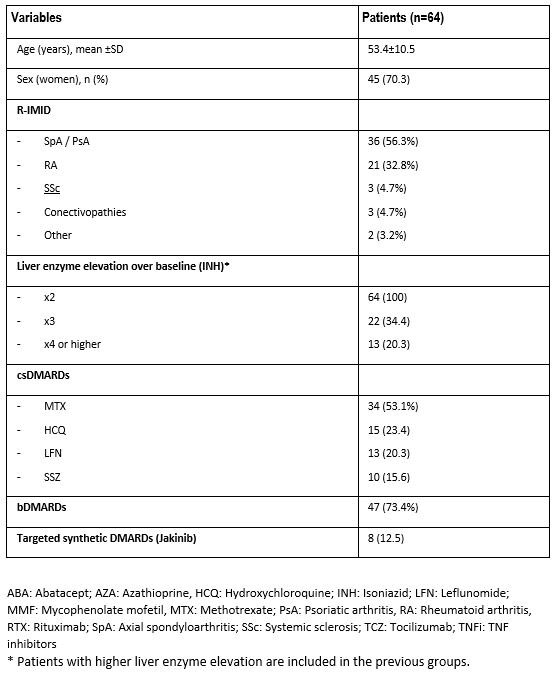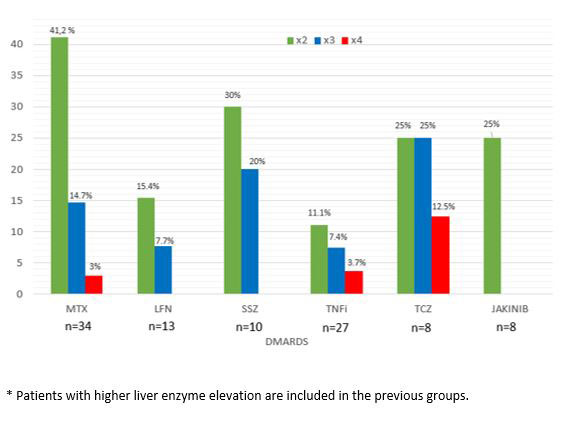Session Information
Session Type: Poster Session B
Session Time: 9:00AM-10:30AM
Background/Purpose: Isoniazid (INH) is used to treat latent tuberculosis infection (LTBI), and hepatotoxicity is one of the most frequent adverse effect. Several Disease-modifying drugs (DMARDs) can also cause hepatotoxicity. Many patients with rheumatic immune mediated diseases (R-IMID) receive INH prior to DMARDs for prophylaxis of LTBI. This risk of hepatotoxicity with DMARDs after hepatotoxicity with INH is unknown.
Our aim was to assess the risk of hepatotoxicity with DMARDs in patients who have presented hepatotoxicity with INH.
Methods: Study of all consecutive R-IMID patients evaluated in the last five years (2016-2020) in a University Hospital, who presented hepatotoxicity after INH and later received DMARDs. We study if they also presented hepatotoxicity with DMARDs. Hepatotoxicity was defined as an elevation of liver enzymes (ALT and/or AST) upper the high limit after the introduction of the treatment.
Results: INH was used in 232 of 7218 patients with R-IMID. We finally included 64 patients (45 women; 70.3%; mean age 53.4±10.5 years), who had hepatotoxicity due to INH (TABLE). The most frequent R-IMIDs were rheumatoid arthritis, axial spondyloarthritis and psoriatic arthritis. Methotrexate (MTX) (n=34, 53.1%) and TNF inhibitors (n=27, 42.2%) were the conventional and biologic-DMARD more frequently used, respectively. Hepatotoxicity was higher with MTX (14 of 34, 41.2%), and lower with the other DMARDs (FIGURE). Hepatotoxicity was not observed with hydroxychloroquine, azathioprine, mycophenolate mofetil, secukinumab, abatacept or rituximab.
Conclusion: In patients with previous hepatotoxicity with INH, we observed an increased risk with different DMARDs, especially with MTX.
To cite this abstract in AMA style:
Martínez-López D, Osorio-Chávez J, Portilla V, Alvarez Reguera C, Herrero-Morant A, Sánchez-Bilbao L, Gonzalez-Mazon i, González-Gay M, Blanco R. Increased Risk of Hepatotoxicity with DMARDS in Patients with Previous Liver Toxicity with Isoniazid: Study in a Single University Hospital [abstract]. Arthritis Rheumatol. 2022; 74 (suppl 9). https://acrabstracts.org/abstract/increased-risk-of-hepatotoxicity-with-dmards-in-patients-with-previous-liver-toxicity-with-isoniazid-study-in-a-single-university-hospital/. Accessed .« Back to ACR Convergence 2022
ACR Meeting Abstracts - https://acrabstracts.org/abstract/increased-risk-of-hepatotoxicity-with-dmards-in-patients-with-previous-liver-toxicity-with-isoniazid-study-in-a-single-university-hospital/


